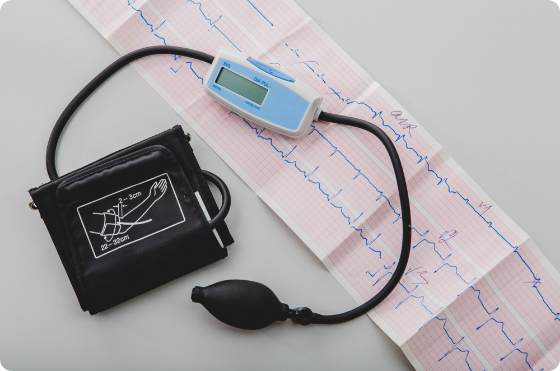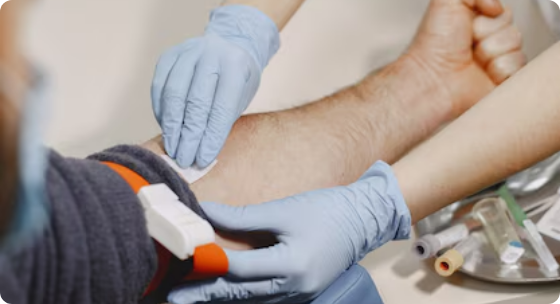What is a
Cardiology Consultation?
A cardiology consultation is a comprehensive evaluation of your cardiovascular health conducted by a heart specialist (Cardiologist). This consultation is designed to assess heart function, diagnose potential heart conditions, and create a tailored treatment plan if necessary. As part of our cardiology services, we ensure you receive a comprehensive approach customized to your needs.
During the consultation, the cardiologist reviews your medical history, performs a physical examination, and may recommend various diagnostic tests such as electrocardiograms (EKGs), echocardiograms, exercise tolerance tests (ETT), and blood tests.
What Diseases Does
a Cardiologist Treat?
Cardiologists at Cardiology Care, NYC specialize in diagnosing and treating a wide range of heart-related conditions,
including but not limited to:
- Coronary Artery Disease
- Heart Failure
- Heart Valve Disease
- High Cholesterol
- Cardiomyopathy
- Arrhythmias
- Heart attack
- Atherosclerosis
- Angina
- Aorta Disease
- Rheumatic fever
- Angioplasty
- Diabetes
- Echocardiology
- Hypertension (High Blood Pressure)
- Congenital Heart Disease
- Peripheral Artery Disease
- Atrial Fibrillation
- Interventional cardiology
- Atrial septal defect
Our experienced cardiology care consultants deliver comprehensive evaluations and advanced treatment plans, helping patients navigate even the most complex cardiovascular conditions.
Who Is a Candidate for
a Cardiology Consultation?
You might benefit from a cardiology consultation if you:
- Experience chest pain, shortness of breath, palpitations, or dizziness.
- Have risk factors for heart disease, such as high blood pressure, high cholesterol, diabetes, smoking, or a family history of heart disease.
- Have been diagnosed with a heart condition and require specialized care and consultation.
- Need a second opinion on a heart-related diagnosis or treatment plan.
- Wish to consult a cardiologist for expert advice on complex symptoms or second opinions.
- Seek preventive care to maintain optimal heart health from a trusted cardiologist NYC.
Which Tests Are Included In A
Cardiology Consultation?
To accurately diagnose and evaluate your heart health, our cardiology consultation includes a variety of tests, such as:
Electrocardiogram (ECG)
Measures the electrical activity of your heart to detect abnormalities.
Echocardiogram
Uses ultrasound to create detailed images of your heart’s structure and function.
Stress Testing
Assesses how your heart performs under physical stress, often involving exercise on a treadmill or a stationary bike.
Holter Monitoring
Monitor your heart’s activity continuously over 24-48 hours to detect irregularities.


Blood Tests
Check for markers that indicate heart disease, such as cholesterol and triglyceride levels.
Cardiac CT or MRI
Advanced imaging techniques to get detailed pictures of your heart and blood vessels.
Chest X-ray
Provides an image of the heart, lungs, and chest bones to identify any abnormalities.
Understanding The Results and Medical Treatment
After your consultation and tests, our best cardiologist NYC will:
Discuss your medical records in detail, explaining what they mean for your heart health.
Provide a clear diagnosis, if applicable, and outline your treatment options.
Develop a personalized treatment plan, which may include lifestyle changes, medications, or procedures.
Schedule follow-up appointments to monitor your progress and adjust your treatment plan as needed.
Ensure you have the support and resources necessary to manage your condition effectively.
Frequently Asked Questions
What is a heart specialist?
A heart specialist, or heart doctor, is a doctor who diagnoses and treats conditions and diseases related to the heart.
Who are cardiology consultants?
Cardiology consultants are experienced cardiologists who provide expert advice and treatment plans for complex heart diseases.
Who is the best heart consultant?
Cardiology Care in NYC is highly regarded, with top specialists like Dr. Dennis Ehrich, known for their expertise in comprehensive cardiovascular care.
How can I adopt healthy lifestyle habits?
Adopt healthy lifestyle habits by incorporating regular exercise, a balanced diet, and adequate sleep into your daily routine, and by avoiding harmful behaviors such as smoking and chronic alcoholism consumption. Additionally, manage stress through mindfulness practices and seek regular medical check-ups to monitor your health.
What to do in coronary artery disease?
If you have coronary artery disease, follow your doctor’s treatment plan, which may include medications, lifestyle changes, and possibly procedures like angioplasty or surgery. Adopt heart-healthy habits such as maintaining a balanced diet, exercising regularly, managing stress, and quitting smoking to improve your heart health and reduce symptoms.





